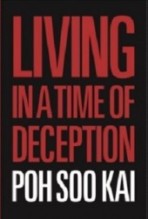Originally published on 23 Dec 2010 at http://s-pores.com/2010/12/blue-gate/
In recent years, historians have increasingly written not of a single Singapore story, but of Singapore stories. Such stories are various: the experiences of political activists outside the People’s Action Party, for instance, or the lives of groups marginalized in terms of class or community by the colonial and then the new national states. One genre of narratives that has proved particularly powerful has been accounts of political imprisonment under the provisions of the Internal Security Act, exemplified by Said Zahari’s two books, Dark Clouds at Dawn (2001) and The Long Nightmare (2007). Such stories consciously aim to give sympathetic inside accounts of principled positions of opposition to the People’s Action Party, to testify against injustice, and thus to rehabilitate the reputations of their protagonists which have been crushed by dominant historical narratives. Yet their writers also face a difficulty. The act of witnessing is always haunted by the invisible presence of an official history that must be rewritten. In Said’s account, and indeed in accounts which feature later, and less prolonged, periods of imprisonment, such as Francis Seow’s To Catch a Tartar, the task of the rehabilitation of personal reputation often overwhelms the narrative, making it more difficult for it to do other kinds of historical work.
Testimony published more recently by those arrested under Operation Spectrum in May 1987 and later, in what is now remembered as the “Marxist Conspiracy,” tells a different kind of story. Seow apart, those who were arrested under the ISA during the period were not public figures, but rather church workers, theatre practitioners and social activists, as the testimonies from detainees such as Vincent Cheng, Kevin De Souza, and Tang Lay Lee collected in Fong Hoe Fang’s That We May Dream Again (2009) show. Teo Soh Lung, who recounts her detention in Beyond the Blue Gate, at one point reflects that unlike Nelson Mandela, Chia Thye Poh, or Said Zahari, she has “no cause to fight for” (212), and her story concludes with her giving up all legal action against the Singapore government immediately before her release; on one level, her detention is “a waste of time” (212). Yet no one could say the same of her retrospective account of the imprisonment. The book is engagingly written in two sctions. The first is a diary constituted immediately after Teo’s release in September 1987. The second is a longer narrative account of the detainees’ public statement concerning their treatment when in jail and protesting their innocence, their re-arrest, and Teo’s subsequent legal actions while in detention until her release in June 1990. Teo’s memoir, if it can be called that, was completed in 1991, and as now published—with a few new elaborations–it also the status of a historical document.
Having “no cause to fight” for apart from a desire to testify for the benefit of future generations of Singaporeans liberates the book from the burden that many previous accounts of detention have carried. Beyond the Blue Gate becomes compelling for two further reasons: its storytelling, and its detailed legal analysis of the ebb and flow Teo’s legal applications for habeas corpus. The narrative is more powerful because of its acts of unmotivated testimony –- in the Russian poet Anna Akhmatova’s words, “as witness to the common lot, survivor of that time, that place”—and the sharp legal analysis that it brings.
The story Beyond the Blue Gate tells is in itself compelling. If experiences of detention are often monotonous and disorienting, their retelling is not. Teo’s memoir has the drama of initial arrest, of interrogation, personal reflection, and release, and then, under the second detention, of court cases and appearances before the review board, of hopes and disappointments. Two elements of the narrative stand out, and indeed have parallels with other prison memoirs. The accounts of the psychological cat-and-mouse game between the prisoner and her interrogators and later case officers are acutely observed, and intensely self-reflective. Her description of the complex relationship between prisoner and prisoners, in which the prisoner often establishes affective relationships with her jailors despite knowing that these are psychological traps, recalls the prison memoirs of South African Ruth First; such self-awareness, indeed, seems to be a marked feature of women’s prison narratives. The detailed descriptions of cell interiors, and in particular the almost microscopically observed encounters with creatures such as lizards, toads, crickets and even ants, are hauntingly similar to Jawaharlal Nehru’s chapters on animals in prison in his Autobiography.
As a lawyer, Teo is eager not simply to testify, but also to explain the legal complexities and consequences of her various legal challenges to her detention To non-lawyers, arguments and detailed quotations from submissions made in court initially seem overly abstract, slowing down the narrative, and moving from issues of justice to ones of legal technicality. And yet the consequences of her law suits are highly important to Singapore today. The amendments to the constitution made during Soh’s detention changed the relationship between the executive and the judiciary considerably. The abolition of appeals to the Privy Council was perhaps an inevitable development in a postcolonial nation-state. The amendment of the constitution in 1989, however, to limit (and possibly—although this has not yet been fully tested—abolish) the role of judicial review of detention under the Internal Security Act, has less justification, especially given that Singapore’s government is a unicameral legislature that has, since independence, seen prolonged one-party dominance.
Nehru famously commented that the regime in a colonial British prison, with its arbitrary abuses of authority, incompetent management, and widespread use of informers, was a mirror of India under British rule. Teo makes no such explicit argument concerning politics in Singapore: Lee Kuan Yew’s ultimate rejoinder to British journalist Bernard Levin’s critique of the detentions, indeed, was the fact that his government had legitimacy and public trust gained through large majorities in regular elections. As we wait for an election in which a constitutional amendment to substantially increase the number of non-constituency MPs is likely to again change the practice of politics in Singapore, however, Teo’s story has the power to disturb and promote critical thought. It does not lecture, but it educates in the original sense of the word—it leads its readers out, causing them to think not simply about an historical incident, but about principles of constitutionality, separation of powers, justice, and indeed the political and judicial developments necessary for an expanded public sphere in Singapore in the future.
——————————————————————————–
Philip Holden is associate professor in the Department of English Language and Literature at the National University of Singapore, teaching and researching Singaporean and Southeast Asian Literatures. He is also currently an Exco member of the Singapore Heritage Society.




